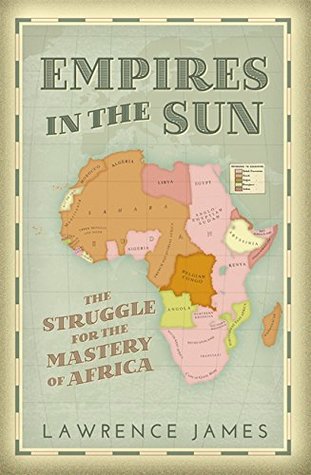Empires in the Sun by Lawrence James (Book Review)

Though published only four years ago in 2017, Empires in the Sun: The Struggle for the Mastery of Africa by Lawrence James already feels dated. While authors do not get to choose the subtitles of their books, this one is nevertheless revealing. The use of the word “struggle” suggests that the history of colonialism took the form of a masculine, almost athletic, contest. This choice of verb is all the more puzzling given that “scramble” is the one most commonly used to describe Europe’s imperial ambitions during the 19th century. And what exactly does “mastery” imply in the context of a continent? Moving beyond the title, Empires provides an account of European colonialism in Africa from the 1830s to decolonization. Readers who enjoy narrative history and authors who traverse decades of time within a paragraph may find the book satisfying.
While I learned many interesting facts from Empires, its flaws are easily noticeable. First, the “struggle” for Africa is described solely from European sources and perspectives. James’ bibliography suggests that this is his modus operandi with other titles ranging from: The Savage Wars: British Campaigns in Africa 1870–1920, The Iron Duke: A Military Biography of Wellington, and Warrior Race: A History of the British at War. I have no problem reading these sorts of books, but one would expect that a contemporary book of African history would be more well-rounded. Second, and not unrelated to the first point, is that the book is blatantly Anglophilic. Somehow the French, Germans, Spanish, Belgians, and Portuguese all come off a bit grubbier in their “struggle for mastery” compared to the British. Lastly, in its desire to dash across time and space of a massively complex historical experience, Empires glosses over some of the most important events in African colonial history. For example, the Berlin Conference receives half a page. Empires’ Eurocentrism does highlight that parts of African history have been neglected, and perhaps strategically so:
The literature on African slavery is selective and imbalanced since it largely ignores the Arab-African slave trade. In scale it equalled - probably surpassed - its Atlantic counterpart and, in some regions, it persisted until the early twentieth century… Yet there has been an extraordinary historical amnesia among the descendants of those who participated in it. The collective moral shame and regret felt by subsequent generations of Europeans and Americans have never been shared by Turks, Egyptians, and Arabs.
There were a few references in Empires that seemed absolutely fascinating but received no more than a paragraph. If anything, James could have probably spent his time writing about these historically beguiling women that I had never heard of before:
The outbreak of the Crimean War in 1854 led to tales of an impending landing by the Russians, who would liberate the Xhosa. Two years later, a prophetess, Nongqawuse, called on the Xhosa to slaughter all their cattle, a sacrifice that would be the prelude to the extinction of the Europeans and a dawn of a golden age. She and her fellow soothsayers were believed, and 400,000 cattle were killed…
In the early 1890s the Bari, who had a historic tradition of female leaders and warriors, were led by Kiden, a prophetess with magical powers. She proclaimed that her god was stronger than Allah and forced the Mahdists to retreat.
One thing Empires does well is to connect how European domestic politics impacted the behavior of state actors in Africa. For example, Sir Garnet Wolseley, one of the most effective and ruthless of Britain’s generals, remarked that he was constrained from massacring the local population by “the howling Societies at home who have sympathy with all black men.” James is likely right when he points to the British missionary movement as being largely responsible for the (relatively) less brutal manner in which the British empire conducted its affairs. Even economic interests were, at times, overridden for domestic reasons:
Rhodes asked the British government whether the company could take over the administration of the Bechuanaland Protectorate from the Foreign Office. Its nominal ruler, Khama III … object strongly: ‘Is the great Queen not able to protect us from the Chartered Company’? They hoped so, for its intention was to ‘impoverish us so that hunger may drive us to become the white man’s servants who dig his mines and gathers his wealth.’ This candid analysis was very close to the truth and its conclusions were repeated by the missionary and humanitarian lobbies which had been shocked by reports of mass slaughter during the recent war in Rhodesia. Rhodes’ request was rejected.
The missionary movement (i.e. Wolseley’s howling societies) was both a catalyst and inhibitor to the colonial enterprise. British representatives would have preferred to have strike alliances in the spirit of realpolitik rather than actually make a concerted effort to abolish the slave trade. Of course, the the missionaries’ “sympathies with all black men” could also be used to justify British annexation as was the case in southern Africa against the Boer republics. In the long-run, the missionary movement’s contribution to the undoing of colonialism stems from its educational programs. Almost every independence leader in British-Africa was mission-educated: Kenyatta, Nkrumah, Nyerere, Kaunda, Azikiwe, and Banda. A mission-education comes just after a JB:
Bernard: And as you know the letters JB are the highest honour in the Commonwealth.
Hacker: JB?
Sir Humphrey: Jailed by the British. Gandhi, Nkrumah, Makarios, Ben Gurion, Kenyatta, Nehru, Mugabe, the list of world leaders is endless, and contains several of our students.
One of Empires’ more speculative passages is what would have happened to Africa in the absence of a scramble? James suggests that a host of minor empires and self-interested polities would have filled the gap. The Mahdist empire may how conquered all of Egypt and parts of east Africa. Arab slavers like Tippu Tip or the Sultans of Zanzibar may have solidified their economic stranglehold over most of central and eastern Africa. The Boer republics of the Transvaal and Orange Free State may have come to conquer most of southern Africa driven by superior military weapons and a messianic drive fuelled by a belief in racial supremacy.
The closing scenes of Europe’s “struggle” for African territory was also its most brutal crescendo as the tools of modern warfare were used in grotesque ways. The Rif wars that took place between a crumbling Spanish empire and Berber tribes is a notorious example. Initially, Spanish military incompetence led to repeated defeats including the infamous Battle of Annual (akin to British retreat from Kabul in the first Anglo-Afghan war). Undaunted by these tactical defeats, the Spanish eventually subdued their opponents with mass atrocities and the use of chemical weapons (i.e. gas). Another Mediterranean nation seeking to revive its national glory was Italy who solidified their control over Libya in what was referred to as the Second Italo-Senussi War. The incompetence of Italian generals was, like Spain, offset by chemical weapons and indiscriminate violence against non-combatants. Mussolini’s dream of a new Roman Republic reached its apex in the Second Italo-Ethiopian War. Disturbingly, the English writer and journalist Evelyn Waugh said he hoped that the Ethiopians would be “gassed to buggery.”
The final chapters of Empires covers decolonization and the Cold War. It is clear that American and Soviet rivalry allowed dictators to maintain their power by leveraging the anxieties of either superpower. The book concludes with the end of Apartheid in South Africa, which was the last vestige of direct European “mastery” on the continent. Empires could have been a better book if its ambition was narrower, its sources wider, and its author more cognisant of the times.
